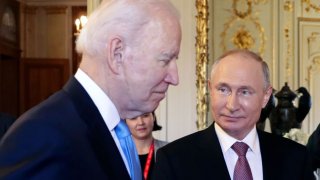
- President Biden has accepted "in principle" a meeting with Russia's Putin in what could be a last-ditch effort at diplomacy over tensions surrounding Ukraine.
- "President Biden accepted in principle a meeting with President Putin following that engagement, again, if an invasion hasn't happened. We are always ready for diplomacy," White House press secretary Jen Psaki said.
President Joe Biden has accepted "in principle" a meeting with Russian President Vladimir Putin in what could represent a last-ditch effort at diplomacy over tensions surrounding Ukraine and a possible avenue to avert a looming invasion directed by Moscow.
WATCH ANYTIME FOR FREE
>Stream NBC10 Boston news for free, 24/7, wherever you are. |
Jen Psaki, the White House press secretary, said Sunday evening that the summit between the two world leaders would happen following a meeting between Secretary of State Antony Blinken and his Russian counterpart, Foreign Minister Sergey Lavrov. That meeting is scheduled for later this week.
Psaki noted that the agreement is conditioned on Moscow holding off on an invasion.
Get updates on what's happening in Boston to your inbox. Sign up for our >News Headlines newsletter.
"As the President has repeatedly made clear, we are committed to pursuing diplomacy until the moment an invasion begins," Psaki said in a statement. "President Biden accepted in principle a meeting with President Putin following that engagement, again, if an invasion hasn't happened. We are always ready for diplomacy."
The Kremlin said on Monday that there were currently no concrete plans for a meeting between Putin and Biden, according to Reuters.
News of a possible one-on-one between Biden and Putin comes as the White House warns that a Russian invasion of Ukraine could come at any time. Moscow has for weeks built up its military force on its ex-Soviet neighbor's northern and eastern borders, with recent totals putting Russia's force at about 190,000.
Money Report
The threat of an assault by Russia has kept global markets on edge for much of the last several weeks, with oil prices climbing and equities volatile.
The broad S&P 500, which tracks the equity performance of the largest U.S. companies, is down 3.69% in February, while the Nasdaq Composite has shed 4.8%. West Texas crude oil futures have gained 4.2% over the past month.
The potential for imminent conflict forced Biden earlier on Sunday to scrap plans to return to his home in Delaware following a two-hour meeting with his national security team.
The rare Sunday National Security Council meeting began around noon and lasted a little over two hours, according to reporters who watched the attendees arrive and then depart the White House compound. The abrupt cancellation to the president's holiday-weekend plans carries heightened meaning in recent days given the administration's belief in a looming Russian offensive.
Biden spoke with French President Emmanuel Macron, who's emerged as a crucial diplomat between the U.S. and Russia over the course of the frenzied weekend. Macron's office said that, this weekend alone, the French president spoke with Biden, Putin, British Prime Minister Boris Johnson, German Chancellor Olaf Scholz and Ukrainian President Volodymyr Zelenskyy.
Moscow has to date insisted it has no plans to invade Ukraine and said its forces in Belarus are there to conduct military drills over the next week.
Despite U.S. concerns that Russia could strike any day, the White House has also stressed that there's still room for diplomacy. NATO Secretary General Jens Stoltenberg appeared to leave room for a peaceful solution when he spoke with CNBC's Hadley Gamble at the Munich Security Conference on Saturday.
"They have all the capabilities in place, Russia, to launch an attack on Ukraine without any warning at all. No one is denying that Russia has all these forces in place," Stoltenberg said. "The question is, will they launch an attack?"
Those comments came as Russia's military launched ballistic and cruise missiles on Saturday, an exercise the Kremlin called a "planned exercise of the strategic deterrence forces."
— CNBC's Christina Wilkie contributed reporting






